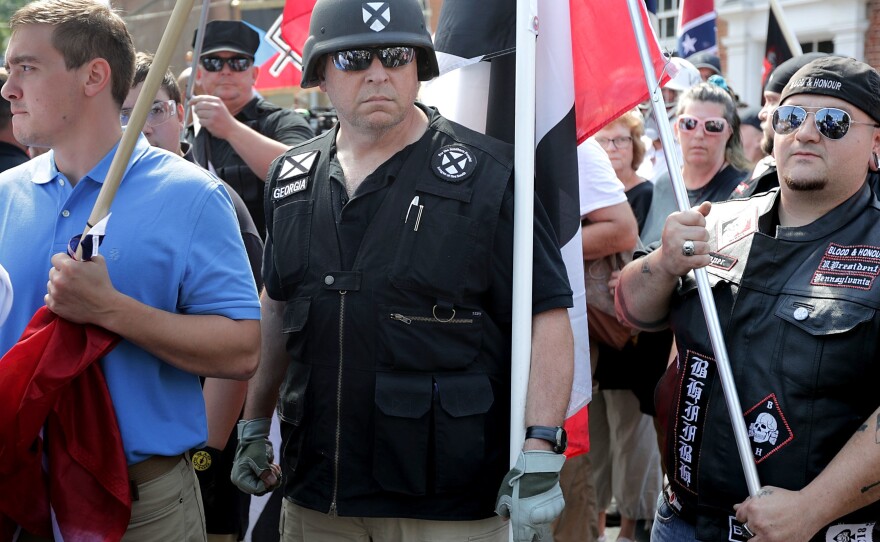A 180-page online screed attributed to the white man accused of killing 10 people at a Tops Friendly Market in Buffalo on Saturday has brought a once-fringe white extremist conspiracy theory into the spotlight. But the underpinnings of the "great replacement" conspiracy theory, which has been iterated on over time to appeal to wider audiences, has penetrated a much more mainstream portion of American society. A recent poll, conducted by the Associated Press-NORC Center for Public Affairs Research, found that one in three American adults now believes in a version of replacement theory.
The speed with which this false narrative has tipped into American discourse since a French ethnonationalist first coined the term roughly a decade ago has stunned even extremism experts who have tracked the spread of hate-filled ideologies. They cite the failure of major social media platforms to effectively moderate such content, the role of Fox News hosts in amplifying these ideas, and the uptake of the conspiracy's language by some elected Republican officials.
Demographic change
Between 2010 and 2020, the percentage of Americans who identified as "white only" declined by more than 10 percent, from 72 to 62 percent. During that same decade, several Western European countries saw record influxes of migrants from Muslim nations. It is against the backdrop of this demographic change that replacement rhetoric has accelerated in recent years.
"In the U.S., [it's] often called 'white genocide.' In Europe, [it's] called 'Eurabia,' " said Cynthia Miller-Idriss, professor and director of the Polarization and Extremism Research and Innovation Lab at American University.
The baseless theories claim that these population shifts are orchestrated by elite power holders. In the U.S., Miller-Idriss said white nationalists ascribe the plot to Jews who they believe are bringing in immigrants and promoting interracial marriage to suppress whites. In Europe, the false narrative blames elite politicians for a growing Muslim population. Miller-Idriss said the coining of the term "great replacement" in France marked a key moment in the growth of these beliefs.
"It has unified and really spread [the conspiracies] online in memes and videos and in a lot of propaganda," she said. "It capitalized on a moment when you're not just reading written propaganda or sharing it in a newsletter or in a small group in a backwoods militia. But it's circulating in these dark online spaces where this [alleged] Buffalo shooter writes he was exposed and radicalized."
From there, the conspiracy theories migrated toward progressively less fringe conservative media platforms, said Jonathan Greenblatt, CEO and national director of the Anti-Defamation League.
"We have literally watched as ideas that originate on white supremacist message boards, or like the dark web – the places that are very difficult to get to – move," said Greenblatt. "They literally jump to [internet message boards like] 4chan and 8chan, which are much more accessible, [then] they jump to web sites like The Daily Caller or Breitbart, and then they jump to Tucker Carlson's talking points or Laura Ingraham's talking points, or other AM radio DJs' talking points. And then you have theoretically mainstream Republican politicians repeating some of this stuff."
Carlson and Ingraham are Fox News hosts.
"Sanitizing" the message
Although the roots of the "great replacement" are firmly planted in the organized white supremacist movement, a version of the baseless conspiracy has spread among a wider swath of Americans with some minor tweaking of language. Matthew Gertz, a senior fellow at Media Matters for America, said that Carlson has framed the issue around voter replacement.
"What he says is that the Democrats are importing immigrants and that they are replacing Americans," said Gertz. "But no one should really be confused by what he is trying to do. The specific cases that he's talking about are Central American immigrants, they are immigrants from Africa, they are immigrants from the Middle East."

Greenblatt, whose organization has repeatedly called on Fox News to fire Carlson, said figures such as Carlson have sought language that might be palatable to more Americans. In moving away from white nationalist terms like "white genocide" and "Jewish cabal," they have repackaged the conspiracy as one driven by political partisanship.
"It has been an intentional effort ... to take these ideas and to try to sanitize them ... so they could bring their ideas into the mainstream," said Greenblatt.
Fox News declined to comment in response to questions from NPR about the role that critics say Carlson and Ingraham have played in stoking fears over replacement.
Greenblatt, Gertz and Miller-Idriss say claims of an orchestrated "immigrant invasion" have gained legitimacy through the endorsement of some elected Republicans, most notably former President Donald Trump. But they note that the messaging has continued after Trump left office.
"Elise Stefanik has pushed the same thing," said Gertz, referring to the third-highest ranking Republican in the U.S. House of Representatives. "This is moving steadily into mainstream Republican politics."
How to fight a pervasive conspiracy theory?
The document believed to have been written by the suspected gunman in the Buffalo attack does not ascribe his radicalization to Fox News or rhetoric of politicians. Rather, he describes it as taking place on the same internet chat boards that were early to adopt the language of the racist "great replacement" conspiracy theory, such as 4chan.
"[Those are] still, I think, the spaces and places we should be most worried about," said Miller-Idriss.
Still, Miller-Idriss and other extremism experts say the mainstreaming of "replacement" theory remains alarming. Greenblatt said it isn't enough to condemn the violence, because speech that dehumanizes other people – whether Blacks, immigrants or Jews – can inspire violence.
"What I would suggest is that people in positions of authority, who have platforms, should use those platforms responsibly and call out this kind of ugliness and cease the incitement immediately because it's too dangerous to do otherwise," he said.
In the wake of the tragedy, much attention is focusing on whether stricter gun laws might have prevented it, the role of social media, whether the suspected gunman had a history of mental health problems, and whether law enforcement authorities missed early red flags.
"But all of that really doesn't make a difference if [individuals] in the end don't have a basic understanding of the legacy of racism, of structural racism [and of] systemic racism in this country," said Miller-Idriss.
She said that many young people observe the racial disparities in American society and will seek out answers to them. The document believed to be linked to the suspect pulls data from dubious online sources to support spurious claims of biological racism and crime rates.
"They may not be talking about it from good academic sources or good learning sources," Miller-Idriss said, "but they're going to be hearing about it in dark online spaces instead."
Copyright 2025 NPR







